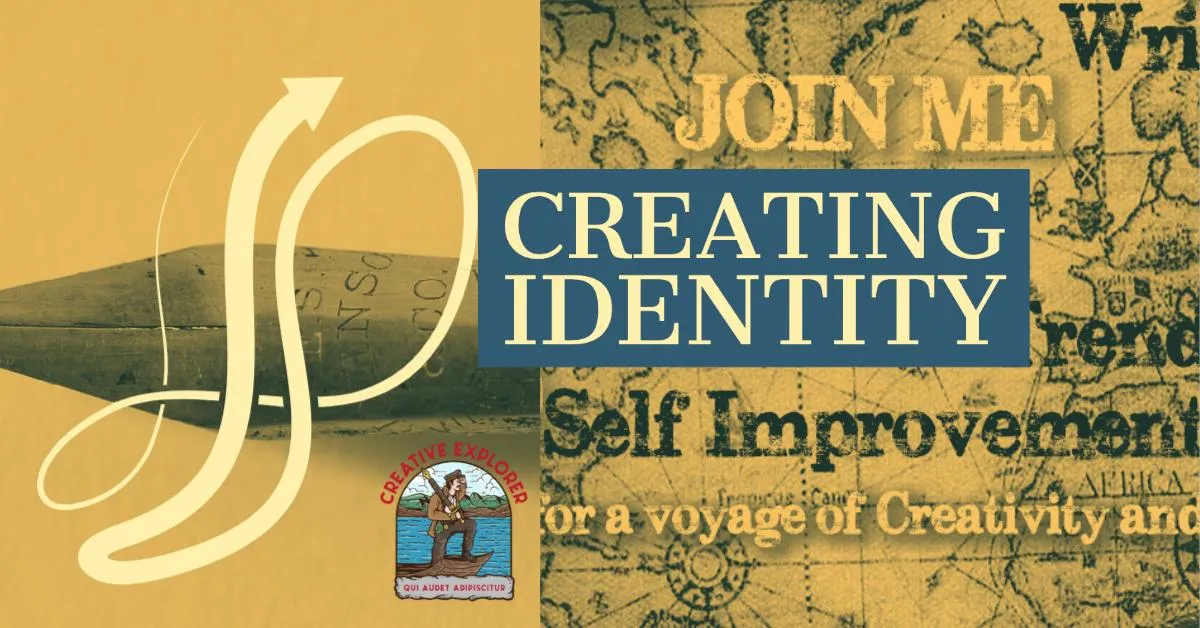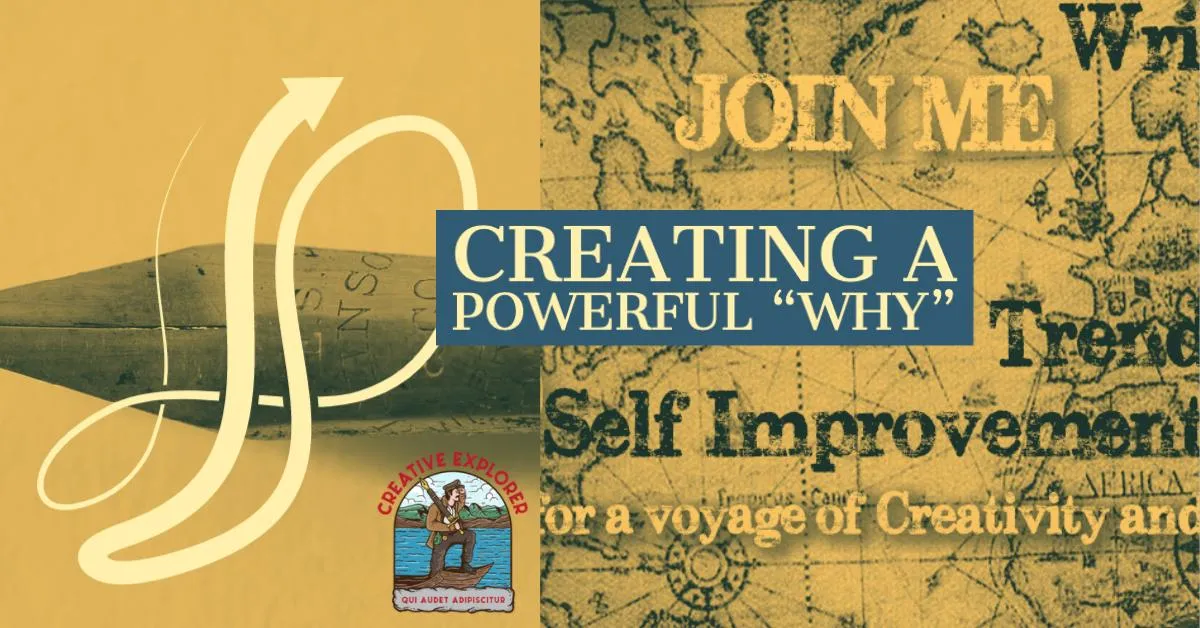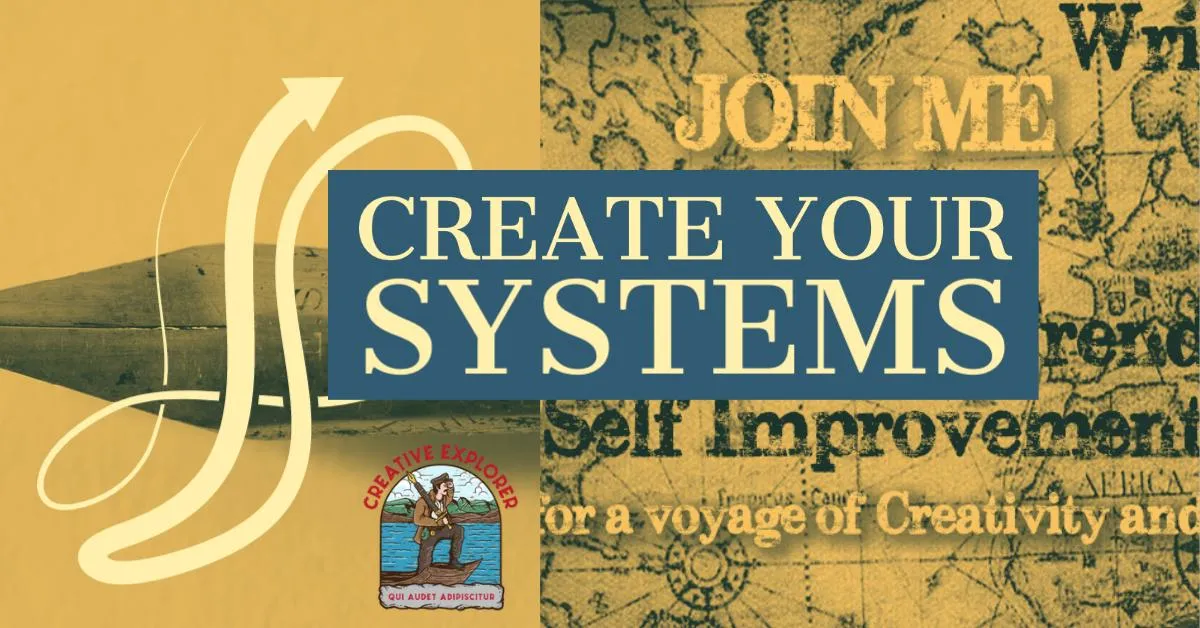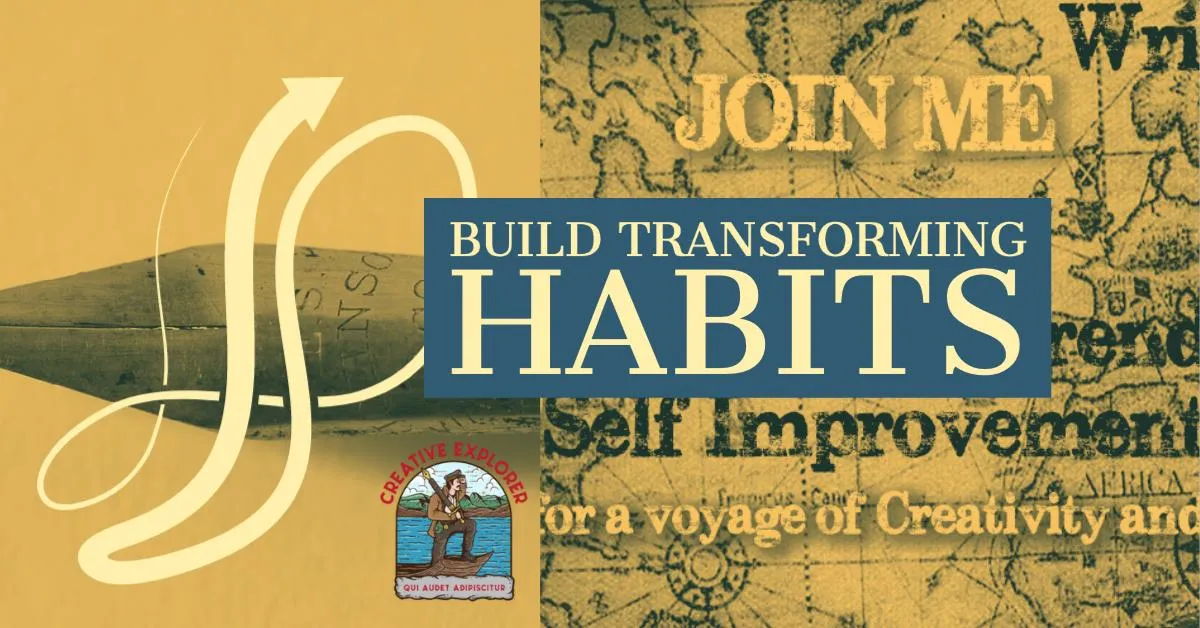"The Society that separates its Scholars from its Warriors, will have its thinking done by cowards and its fighting done by fools." Thucydides

PURPOSE: Become the Scholar Warrior for your Goals
Improve Every Single Day!
Improve Yourself 1% a Day = 3600%+ in a Year
Thought-Technique-Strategy of the Week:

Create Your Powerful Identity
Let's say you wish to excel in the art of painting. Or open your own woodworking business. Or become a Filmmaker which I did many years ago. The key is to utilize a Powerful Identity in reframing your Focus. Let's stick with painter for the moment.
Use the words: "I am a painter." The powerful use of the "I am..." phrase welds this new outlook to you mentally, intellectually but, more importantly, emotionally. Why emotionally? When you talk about painting (or any very exciting goal), then you can feel the electrical excitement within your body and Being.
"Being" is the act of existing within this newly embraced identity. Then you grow and become.
READ THE MAIN ARTICLE HERE
7 Actions To Change Your Life
Michael's Kenpo Karate Weapons Form - Knife & Pistol
You can see my Pistol & Knife form at approximately 10:31 here in the video from 2010. This is at Bryan Hawkins Kenpo Karate where I have studied Kenpo Karate for approximately over 35 years. The form is one that I created to advance in the system, utilizing Kenpo Karate principles. I use the form with the primary weapon as the firearm, duly guarded and using the knife for close-in drills. This is the training the Warrior phase!




WARRIOR: TACTIC #7 USE ALINSKY'S RULES
Citizen Soldier Technique: Digest Alinsky’s Rules on Ethics of Means and Ends
Alinsky’s ethical rules deal with the Means and the Ends. Does the Ends justify the Means? In the left-wing world of moral relativism, it is absolutely justified. To understand who you are fighting agaist, you have to understand the mentality.
The judgment of the ethics of means is dependent upon the political position of those sitting in judgment. Ethical judgement is not objective but subjective. Who is judging who here?
In war the end justifies almost any means. Politics is war so the end is the objective no matter what means are employed
Judgment must be made in the context of the times in which the action occurred and not from any other chronological vantage point. Timeless principles are void; one’s actions depend on the circumstances and are morally relative.
Concern with ethics increases with the number of means available and vice versa. The more ways (means) to accomplish the ends (objective), then the more ethical questions one has.
The less important the end to be desired, the more one can afford to engage in ethical evaluations of means. If the goal isn’t that important, then become more ethical. If the goal is very important, then forget ethics – get the job done!
Generally, success or failure is a mighty determinant of ethics. If you succeed, then you can determine the ethics of your actions. The Victory determines Right and Wrong, not principles.
The morality of a means depends upon whether the means is being employed at a time of imminent defeat or imminent victory. Morality depends only on Victory.
Any effective means is automatically judged by the opposition as being unethical. Your opponent will attempt to smear your success with cries of foul. Fuggedaboutit!
You do what you can with what you have and clothe it with moral garments. Whatever tactics you can employ, use them and call it ‘social justice’, ‘racism’, etc.,
Goals must be phrased in general terms like "Liberty, Equality, Fraternity," "Of the Common Welfare," "Pursuit of Happiness," or "Bread and Peace." Always uses phrases that echo with emotion for the masses.

WARRIOR: TACTIC #7 USE ALINSKY'S RULES
Citizen Soldier Technique: Digest Alinsky’s Rules on Ethics of Means and Ends
Alinsky’s ethical rules deal with the Means and the Ends. Does the Ends justify the Means? In the left-wing world of moral relativism, it is absolutely justified. To understand who you are fighting agaist, you have to understand the mentality.
The judgment of the ethics of means is dependent upon the political position of those sitting in judgment. Ethical judgement is not objective but subjective. Who is judging who here?
In war the end justifies almost any means. Politics is war so the end is the objective no matter what means are employed
Judgment must be made in the context of the times in which the action occurred and not from any other chronological vantage point. Timeless principles are void; one’s actions depend on the circumstances and are morally relative.
Concern with ethics increases with the number of means available and vice versa. The more ways (means) to accomplish the ends (objective), then the more ethical questions one has.
The less important the end to be desired, the more one can afford to engage in ethical evaluations of means. If the goal isn’t that important, then become more ethical. If the goal is very important, then forget ethics – get the job done!
Generally, success or failure is a mighty determinant of ethics. If you succeed, then you can determine the ethics of your actions. The Victory determines Right and Wrong, not principles.
The morality of a means depends upon whether the means is being employed at a time of imminent defeat or imminent victory. Morality depends only on Victory.
Any effective means is automatically judged by the opposition as being unethical. Your opponent will attempt to smear your success with cries of foul. Fuggedaboutit!
You do what you can with what you have and clothe it with moral garments. Whatever tactics you can employ, use them and call it ‘social justice’, ‘racism’, etc.,
Goals must be phrased in general terms like "Liberty, Equality, Fraternity," "Of the Common Welfare," "Pursuit of Happiness," or "Bread and Peace." Always uses phrases that echo with emotion for the masses.

WARRIOR: TACTIC #7 USE ALINSKY'S RULES
Citizen Soldier Technique: Digest Alinsky’s Rules on Ethics of Means and Ends
Alinsky’s ethical rules deal with the Means and the Ends. Does the Ends justify the Means? In the left-wing world of moral relativism, it is absolutely justified. To understand who you are fighting agaist, you have to understand the mentality.
The judgment of the ethics of means is dependent upon the political position of those sitting in judgment. Ethical judgement is not objective but subjective. Who is judging who here?
In war the end justifies almost any means. Politics is war so the end is the objective no matter what means are employed
Judgment must be made in the context of the times in which the action occurred and not from any other chronological vantage point. Timeless principles are void; one’s actions depend on the circumstances and are morally relative.
Concern with ethics increases with the number of means available and vice versa. The more ways (means) to accomplish the ends (objective), then the more ethical questions one has.
The less important the end to be desired, the more one can afford to engage in ethical evaluations of means. If the goal isn’t that important, then become more ethical. If the goal is very important, then forget ethics – get the job done!
Generally, success or failure is a mighty determinant of ethics. If you succeed, then you can determine the ethics of your actions. The Victory determines Right and Wrong, not principles.
The morality of a means depends upon whether the means is being employed at a time of imminent defeat or imminent victory. Morality depends only on Victory.
Any effective means is automatically judged by the opposition as being unethical. Your opponent will attempt to smear your success with cries of foul. Fuggedaboutit!
You do what you can with what you have and clothe it with moral garments. Whatever tactics you can employ, use them and call it ‘social justice’, ‘racism’, etc.,
Goals must be phrased in general terms like "Liberty, Equality, Fraternity," "Of the Common Welfare," "Pursuit of Happiness," or "Bread and Peace." Always uses phrases that echo with emotion for the masses.





WARRIOR: TACTIC #7 USE ALINSKY'S RULES
Citizen Soldier Technique: Digest Alinsky’s Rules on Ethics of Means and Ends
Alinsky’s ethical rules deal with the Means and the Ends. Does the Ends justify the Means? In the left-wing world of moral relativism, it is absolutely justified. To understand who you are fighting agaist, you have to understand the mentality.
The judgment of the ethics of means is dependent upon the political position of those sitting in judgment. Ethical judgement is not objective but subjective. Who is judging who here?
In war the end justifies almost any means. Politics is war so the end is the objective no matter what means are employed
Judgment must be made in the context of the times in which the action occurred and not from any other chronological vantage point. Timeless principles are void; one’s actions depend on the circumstances and are morally relative.
Concern with ethics increases with the number of means available and vice versa. The more ways (means) to accomplish the ends (objective), then the more ethical questions one has.
The less important the end to be desired, the more one can afford to engage in ethical evaluations of means. If the goal isn’t that important, then become more ethical. If the goal is very important, then forget ethics – get the job done!
Generally, success or failure is a mighty determinant of ethics. If you succeed, then you can determine the ethics of your actions. The Victory determines Right and Wrong, not principles.
The morality of a means depends upon whether the means is being employed at a time of imminent defeat or imminent victory. Morality depends only on Victory.
Any effective means is automatically judged by the opposition as being unethical. Your opponent will attempt to smear your success with cries of foul. Fuggedaboutit!
You do what you can with what you have and clothe it with moral garments. Whatever tactics you can employ, use them and call it ‘social justice’, ‘racism’, etc.,
Goals must be phrased in general terms like "Liberty, Equality, Fraternity," "Of the Common Welfare," "Pursuit of Happiness," or "Bread and Peace." Always uses phrases that echo with emotion for the masses.

WARRIOR: TACTIC #7 USE ALINSKY'S RULES
Citizen Soldier Technique: Digest Alinsky’s Rules on Ethics of Means and Ends
Alinsky’s ethical rules deal with the Means and the Ends. Does the Ends justify the Means? In the left-wing world of moral relativism, it is absolutely justified. To understand who you are fighting agaist, you have to understand the mentality.
The judgment of the ethics of means is dependent upon the political position of those sitting in judgment. Ethical judgement is not objective but subjective. Who is judging who here?
In war the end justifies almost any means. Politics is war so the end is the objective no matter what means are employed
Judgment must be made in the context of the times in which the action occurred and not from any other chronological vantage point. Timeless principles are void; one’s actions depend on the circumstances and are morally relative.
Concern with ethics increases with the number of means available and vice versa. The more ways (means) to accomplish the ends (objective), then the more ethical questions one has.
The less important the end to be desired, the more one can afford to engage in ethical evaluations of means. If the goal isn’t that important, then become more ethical. If the goal is very important, then forget ethics – get the job done!
Generally, success or failure is a mighty determinant of ethics. If you succeed, then you can determine the ethics of your actions. The Victory determines Right and Wrong, not principles.
The morality of a means depends upon whether the means is being employed at a time of imminent defeat or imminent victory. Morality depends only on Victory.
Any effective means is automatically judged by the opposition as being unethical. Your opponent will attempt to smear your success with cries of foul. Fuggedaboutit!
You do what you can with what you have and clothe it with moral garments. Whatever tactics you can employ, use them and call it ‘social justice’, ‘racism’, etc.,
Goals must be phrased in general terms like "Liberty, Equality, Fraternity," "Of the Common Welfare," "Pursuit of Happiness," or "Bread and Peace." Always uses phrases that echo with emotion for the masses.

WARRIOR: TACTIC #7 USE ALINSKY'S RULES
Citizen Soldier Technique: Digest Alinsky’s Rules on Ethics of Means and Ends
Alinsky’s ethical rules deal with the Means and the Ends. Does the Ends justify the Means? In the left-wing world of moral relativism, it is absolutely justified. To understand who you are fighting agaist, you have to understand the mentality.
The judgment of the ethics of means is dependent upon the political position of those sitting in judgment. Ethical judgement is not objective but subjective. Who is judging who here?
In war the end justifies almost any means. Politics is war so the end is the objective no matter what means are employed
Judgment must be made in the context of the times in which the action occurred and not from any other chronological vantage point. Timeless principles are void; one’s actions depend on the circumstances and are morally relative.
Concern with ethics increases with the number of means available and vice versa. The more ways (means) to accomplish the ends (objective), then the more ethical questions one has.
The less important the end to be desired, the more one can afford to engage in ethical evaluations of means. If the goal isn’t that important, then become more ethical. If the goal is very important, then forget ethics – get the job done!
Generally, success or failure is a mighty determinant of ethics. If you succeed, then you can determine the ethics of your actions. The Victory determines Right and Wrong, not principles.
The morality of a means depends upon whether the means is being employed at a time of imminent defeat or imminent victory. Morality depends only on Victory.
Any effective means is automatically judged by the opposition as being unethical. Your opponent will attempt to smear your success with cries of foul. Fuggedaboutit!
You do what you can with what you have and clothe it with moral garments. Whatever tactics you can employ, use them and call it ‘social justice’, ‘racism’, etc.,
Goals must be phrased in general terms like "Liberty, Equality, Fraternity," "Of the Common Welfare," "Pursuit of Happiness," or "Bread and Peace." Always uses phrases that echo with emotion for the masses.

WARRIOR: TACTIC #7 USE ALINSKY'S RULES
Citizen Soldier Technique: Digest Alinsky’s Rules on Ethics of Means and Ends
Alinsky’s ethical rules deal with the Means and the Ends. Does the Ends justify the Means? In the left-wing world of moral relativism, it is absolutely justified. To understand who you are fighting agaist, you have to understand the mentality.
The judgment of the ethics of means is dependent upon the political position of those sitting in judgment. Ethical judgement is not objective but subjective. Who is judging who here?
In war the end justifies almost any means. Politics is war so the end is the objective no matter what means are employed
Judgment must be made in the context of the times in which the action occurred and not from any other chronological vantage point. Timeless principles are void; one’s actions depend on the circumstances and are morally relative.
Concern with ethics increases with the number of means available and vice versa. The more ways (means) to accomplish the ends (objective), then the more ethical questions one has.
The less important the end to be desired, the more one can afford to engage in ethical evaluations of means. If the goal isn’t that important, then become more ethical. If the goal is very important, then forget ethics – get the job done!
Generally, success or failure is a mighty determinant of ethics. If you succeed, then you can determine the ethics of your actions. The Victory determines Right and Wrong, not principles.
The morality of a means depends upon whether the means is being employed at a time of imminent defeat or imminent victory. Morality depends only on Victory.
Any effective means is automatically judged by the opposition as being unethical. Your opponent will attempt to smear your success with cries of foul. Fuggedaboutit!
You do what you can with what you have and clothe it with moral garments. Whatever tactics you can employ, use them and call it ‘social justice’, ‘racism’, etc.,
Goals must be phrased in general terms like "Liberty, Equality, Fraternity," "Of the Common Welfare," "Pursuit of Happiness," or "Bread and Peace." Always uses phrases that echo with emotion for the masses.
Take Action Today!
SCHOLAR WARRIOR WAY - COURSES

Scholar Warrior Way
Take Action to Transform Yourself
By taking the Scholar Warrior Way Course, you will get Michael's program for Self-Improvement in his pursuit of Creative Excellence in Writing, Filmmaking, Martial arts and his other pursuits from his major curious outlook. Here are the 7 Steps that he uses....
Powerful Why - the Key to Enthusiasm and Fulfillment
Scholar Warrior Identity - Embracing the new Mentality - now!
Your Morning Routine - Starting the day Right.
Brainstorming Your How - Strategy thinking and tactics
Create Your Own Systems - Become efficient with predictable results
Building Transforming Habits - Habit creates Destiny
The Art of Sleep - Long ignored but a necessary health break.
Levels 1, 2 and 3 - Detailing and add more videos, wisdom, resources and Learning Materials for your Growth and Self-Improvement.
FAQS
What is The Purpose of the "ScholarWarriorWay" ?
By engaging in the mental perspective of the Scholar Warrior, you embrace two aspects of your life: The Scholar with a constant focus on self-development and self-improvement. The Warrior whereby you learn techniques about courage, action and derring-do to achieve your true authentic goals for a fulfilled life.
How much does Scholar Warrior Way cost?
The cost of could be absolutely no money if you just want to get on our newsletter to read the various articles on the website. If you want to take the courses on various levels, then you might spend $200-300 per year. Think of it this way: If you could improve yourself 100-200-300-1000-3600% in a single year, then how much is it worth? The price of two meals and drinks at a restaurant that you'll never remember? Make a better life choice.
How do I know I work with the ScholarWarriorWay?
ScholarWarriorWay is broken down into 7 Major Strategies. You can pick one and work on it for a few weeks, then add another strategies. They start with the Powerful Why and end with the Art of Sleep.

